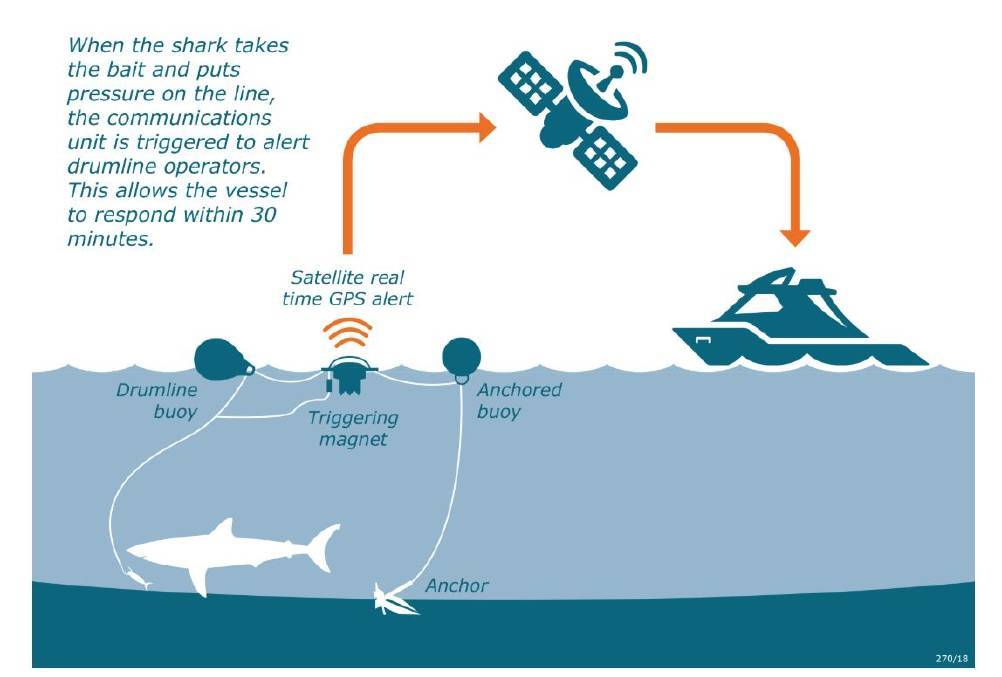Data on NSW licencing reveal the extent of Government-sanctioned destruction of native animals in the state | Conservation groups and wildlife carers to provide evidence of the extent of cruelty at inquiry into licensed killing SYDNEY (5 February, 2026)—Humane World for Animals Australia (previously Humane Society International Australia) will...
Following pressure from the federal government, Western Australia has announced it will be ending its completely non-lethal approach to shark control with the introduction of a SMART drumline trial in the state’s South West.
SMART stands for Shark Mitigation Alert in Real Time, and these drumlines have been advertised as a non-lethal, more selective alternative to traditional drumlines and nets. Using a GPS beacon, they are designed to signal to operators immediately when an animal is caught. Presumably, the operator can then reach the animal within 30 minutes of capture. If the animal caught is a target shark (Great White, Tiger, Bull) over 3 metres, it is tagged, dragged 1 km offshore and released. All other bycatch species are released.
SMART drumline studies were conducted by the New South Wales Department of Primary Industries along the coast of New South Wales at 6 locations: Ballina-Lennox Head, Evans Head, Coffs Harbour, Forster, Kiama and Ulladulla. Some of these trials were conducted in the same areas and at the same time as shark net trials. Over the course of two trials on the Northern NSW Coast shark nets caught 11 target sharks and 409 non-target animals. During the same time period, two trials of SMART drumlines caught 52 target sharks and 19 non-target animals. In the nets: 204 animals died, on SMART drumlines: only 1.


In these cases, the SMART drumlines proved much more effective at catching target animals than the nets, and were more effective at reducing the capture of non-target marine wildlife. Given these results, SMART drumlines could be considered an improvement on shark nets and traditional drumlines. However, during multiple SMART drumline trials in New South Wales, at least 119 non-target animals have still been caught. These animals were not tagged, and therefore their survival after being released cannot be determined. So, can the WA Government really claim these drumlines are non-lethal?
The bycatch associated with SMART drumlines as well as wildlife that may die after release from the drumlines is concerning. We are specifically concerned about the bycatch of vulnerable west-coast grey nurse sharks, as well as species of hammerhead sharks. Hammerheads are listed by the IUCN as either vulnerable or endangered, and are particularly susceptible to what scientists call PRM, or post-release mortality. Again, there is no way to determine the survival of non-target wildlife that is caught on the drumlines and not tagged.
Endangerment and death of any amount marine wildlife is a high price to pay for a shark mitigation measure that isn’t proven to have any impact on ocean user safety or the frequency of shark-human interactions.
Due to the rarity of shark-human interactions (1 in 1.4 million in Australia), the presence or absence of drumlines (SMART or otherwise) cannot and will not have any statistically significant impact on the incidence of shark-human interactions. It’s just not how statistics work. If no shark bites occur during the trial, this should not be viewed as a success attributable to the installation of the SMART drumlines. This would not imply causation.
The success or failure of the trial should be determined on the ability of the drumlines to catch only target sharks and the survival of any target or non-target wildlife. We have to take a precautionary approach and assume, in the absence of tags, that any non-target wildlife will not survive. Therefore, any captures of non-target wildlife should be considered a failure. There also should be a measure in this trial about how much time animals spend caught on the line and therefore the magnitude of their suffering.
HSI expects the SMART drumline trial to result in the inevitable suffering and death of marine wildlife, and therefore opposes the decision to commence the trial.
WA had formerly been an encouraging example to other Australian states and territories in their commitment to completely non-lethal shark control measures. Leading with concern for the marine environment and finding solutions through innovation, WA introduced a world-first consumer subsidy for a scientifically proven effective personal shark deterrent. This example of technology and research-driven solutions to shark-human interaction mitigation provided a great hope to shark and marine conservation in Australia. The SMART drumline Trial is nothing short of a step backwards.
HSI has supported WA’s policy for non-lethal shark control measures in the past, and we look forward to a discontinuation of the SMART drumline trial, and a return to non-lethal measures.


